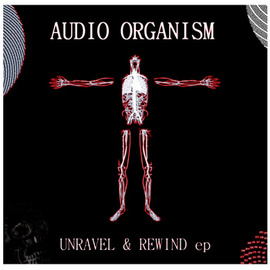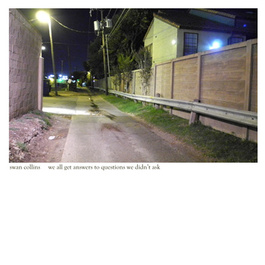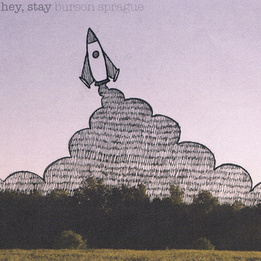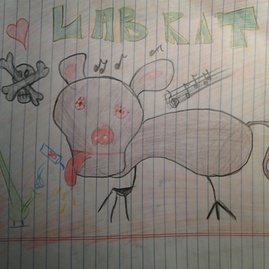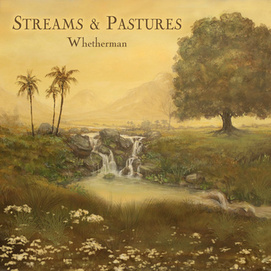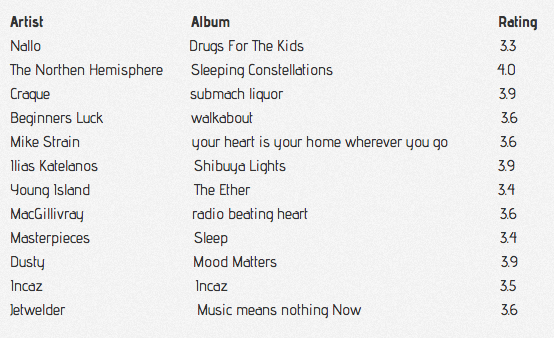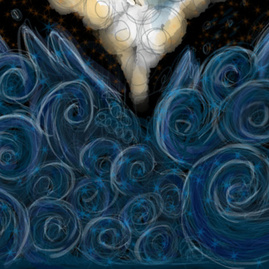|
Travers Macmaster aka Audio Organism has been producing music for a decade and released four albums over that time. Unravel and Rewind, which may be his finest work, is a genre-hopping, electronic production that combines down-tempo beats, industrial elements, and samples that are covered by dark atmospheres that invite the monsters at night to get their groove on. The production is detailed and filled with a surplus of sounds that will keep you interested throughout the album. It was obvious to me after the first song that a lot of time was taken in making this album. Every noise seemed to fit right in its own crevice leaving space for everything to breath. Besides the obvious attention to detail the songs are fun to listen to. The sounds he choses, from the woobly bit crusher type synths on “WooDoo” to the buzzing saw he uses in “Detach” are unique enough to keep your attention. At the focal point of most of these songs are the drums and percussive elements, which are deep and ever changing. The album opener “Wordless” is one of the least ominous songs of the bunch. It utilizes a heavy kick drum surrounding a circus of sounds that could make your head spin as you try to decipher what you’re actually hearing. After a while it isn’t as if you’re listening to separate sounds but one audio organism that contained different parts. The song “Demonic” as you might expect has a bit of a darker tone as one of the vocals samples are manipulated as the occasional sensual scream is heard. As with the other songs the attention to the detail is what makes this song enjoyable. The landscape is constantly evolving and changing over time. One of the most overloaded track is “Hands,” which contains a lot of samples that are torn apart until they are barely recognizable. The last song “Undone” is not unlike the other tracks and build upon its strengths. This is a pretty good album that begs you to put on a nice pair of headphones and enjoy the intricacies and dark tendencies that make up audio organism.
1 Comment
The inspiration for Swan Collins’ latest effort We All Get Answers to Questions We Didn’t Ask is to try to make an album that sounds like musical journal entries. The album tries to capture the fleeting and ever changing moments of his life including the good and the bad. The album is incredibly lo-fi and suffers because of it at times and other times almost benefits from it. For example, the vocals were often buried and muddy but the ukulele had a great sound that benefited from the raw recording. Despite the limited recording platform the songs shine, as they are often sparse and well written. The four-track EP starts with “One Second Behind,” which has a somber sounding organ and vocals that I wish were more present in the mix. The part that is frustrating is that you could hear the potential for a good song but it gets bogged down with the poor production in addition to his occasional off-key singing. The high point comes at the end of the song when he harmonizes his vocals with the organ. The second song “So Much for the Better Days” fares much better with a ukulele as the main instrument. The ukulele also left some room for his vocals to be heard and what do you know - the guy has a pretty attractive voice. The song was good even though there weren’t many lyrics and it mostly revolved around him saying “so much for the better days.” On "It Was Once" he once again takes advantage of the ukulele but he decides to add an electronic drum beat this time around. This was an instrumental piece that didn’t live up to its potential. I’m hoping that he further refines this song as I was listening to it in its demo stage. The last song “Winning Days” is a simple song played on acoustic guitar and it dripped with melancholy. This four-song demo had some great ideas that suffered because of the production. That being said you can imagine Collins coming into his own at some point. As he is working on his current full-length I am hoping he is able to improve some of the production so I can hear his ideas come to fruition.
Burson Sprague is a young electronic musician who creates experimental chill wave music. His latest effort Hey Stay is a solid effort that is not unlike some of Aphex Twin’s softer pieces like “Finger Bib” which has a soft wave of sound that revolves around percussive elements. Some of the songs hit a bit harder like “To The Stars,” which is more dance oriented. While the songs show a lot of promise he is ultimately restricted by some of his resources. For example, as impressive as it is that this was all made in garage band it is also its biggest weakness. Nonetheless, these songs show promise for the young producer as he broadens his pallet.
The first song ”Please” was pleasant enough as it starts with a declaration about his motivation for making music as a warm electronic piano plays a simple melody. The drums are subdued yet complex and create the backbone of the song. On “Do Not” some good ideas were used but not perfectly executed. A steady yet distant drum kit was utilized as flourishes of eastern strings occasionally came into existence. A simple synth tone was used to create an uneasiness throughout the track. “Ascend” does exactly what you expect from the title as it sounds like it is ascending. The song revolves around arpeggiated notes that loop as they become higher in pitch. The main issue here is the mix itself when everything plays at once. There is noticeable digital distortion and well as not enough separation amongst the instruments. “To The Star” was one of my favorite tracks, which brought a welcome change of pace. The song was more dance oriented think Daft Punk if they took a couple of vicodin. The last song unfortunately suffers from some of the same issues as “Ascend” in that once too many elements are introduced the mix sounds are distorted. That being said there are some good ideas in this song. I enjoyed the unconventional use of strings. This album shows me that Sprague has good ideas and a lot of potential but at the same time would benefit from either refining his skills as an engineer or collaborating with someone who know a bit more about creating a mix. Chance McGinness (moniker Tennesse Rain) makes lo-fi recording that lies somewhere between Sublime, John Mayer, and M. Ward. It’s actually a lot better than this description sounds. Granted there were some moments that didn’t sit too well with me but then there are other times where he redeems himself. Despite the occasional blunders his latest album Lab Rat is put together well and has a good pace and the songs don’t overstay stay their welcome. However, I was hoping to hear some of these songs a bit more refined. This album often suffers from poor production. McGinness may want to consider recording in a studio next time around to add a bit of polish to his recording. The first song “Cig Trippin’” had a Jack Johnson/Sublime type vibe which revolved around an acoustic guitar and a beat-box percussion made from his mouth. It wasn’t my favorite song and left me a bit confused as to what type of music I was listening to. In fact, it wasn’t until the third song “Hailey Rey” that I felt I heard some honesty and emotion that was lacking from the first two songs. It featured a nice acoustic melody, good vocal line and a straightforward approach that had the band back in my good graces. There was a vulnerability on this song as well that made it more attractive. “Lab Rat” was a cool song - somewhere between Beirut and Sublime. I liked the vibe and it could have been radio-ready if the production was improved. Other songs like “Find Yourself” sounded like the instruments were not in sync at some points or were just begging for a remix. The Rastafarian vibe that remains throughout the rest of the album is a mixed bag but tends to have more winners and it is ultimately up to the listener to decide whether they want to hear each whole song or keep moving forward to the next track. The album does end on a high note with “Stay Positive” which is a well-crafted song that embraces the fact that we should appreciate the time we have while we still have it. Overall, Lab Rat shows us that Tennessee Rain is capable of making good songs with very little resources. In fact, if you dig this album you should check out his latest entitled eastside go-getters which futher improves on his songwriting ability.
I remember back in the day when Odelay was released and looking at the credits and realizing that Beck Hansen played most of the instruments I was awestruck. Thinking one man could play all those instruments was quite impressive. This is the same thing we find with Patrick Stelle aka Balla Dear who plays an arsenal of instruments on his new album entitled Knife and Novice. He picks up the harmonica, ukulele, e-bow, djembe and guitar to name a few in addition to singing his heart out. None of this would matter if the music weren’t up to par. Luckily, this is an incredibly heartfelt album drenched in emotion and Americana not unlike that of Fleet Foxes. The album sounds great top to bottom as the vocals are beautifully sung and the arrangements are meticulously crafted and implemented. These are the type of songs that can remind one of a simpler time, when the plains in America were as vast as our optimism. Some songs are melancholy yet hopeful, tragic yet inspiring. A great combination of emotions that pull your attention to the song and don’t let go until the album is over. The album starts with “Introduction (Heart of Gold)” which contains soulful vocals as the centerpiece while a rusty acoustic guitar and harmonica are played in the background. It’s a rather somber piece that got my attention. Things pick up a bit with “Jangle of My Heart” which introduces rhythmic elements as well as an unbridled exuberance that was hard to ignore. The vocals were again heartfelt and I thoroughly enjoyed the addition of the background vocals which were subtle but added a lot of substance. “I Dream At the Gate” was one of the best songs on the album. The harmonized vocals were absolutely wonderful and reminded me of something I might have heard on the “Brother Where Art Thou” soundtrack. While some of the later songs didn’t fare as well as the first half of the album I still enjoyed them. This is an album that makes you realize how integral it is to keep the human element alive in music. No program can replicate the emotional dexterity that is required to produce this. Knife and Novice is ultimately an album that reminds us that we aren’t only connecting with the sounds that we hear but the human making them.
Passive Noise is the solo project of John Careaga. In addition to his studies he composes ambient music that is covered with hints of shoe gaze and post-rock. He recently released a short EP of five songs entitled Simple, But Not Simpler, which showcases his talents. The EP has inspired songs that while they may not burst with originality emulate other artists without being a blatant rip-off. The album was completely done by him and sounds much better then most DIY production does. All five songs borrow from the same palette but sound uniquely their own. Certain songs sound more ominous while others have a Persian-feel that are laced with various bleeps, glitches and. anomalies. The first song “Rest Easy” which was probably my favorite contains all the elements that I am a complete sucker for. The distorted guitars that sound like The Jesus and Mary Chain and the atmospheric Explosions in the Sky type quality, which slowly builds the song to an apex. Lasting under three minutes I was hoping for more but didn’t get it. The second song felt a bit more traditional and new agey but luckily this was the only song that didn’t do it for me. “Casual” has drums that are upfront in the mix while a somewhat Persian sounding mist floats around in the mix. I thought the drums could have been softer which would have benefitted the song, perhaps taking the rock drum kit and transforming it into something more non-traditional. “Flight from Wonder” hits the right marks because the glitchy bleeps and blips work well with the distant pads. The album ends with “Landing” which only lasts about a minute and a half and sounds like an alien aircraft is landing on Earth. Passive Noise has some good ideas on this album that are implemented well and with a little bit of refinement could have been a great album. I will be keeping my eye on this artist it see how his skills progress. I smiled as I thought of Nicholas Williams, the brainchild of Whetherman, recording Streams and Pastures in a steel bathtub filled with warm water during a Virginia sunset. When I found out the bulk of the album was recorded in Florida, with the mastering being done in sunny Southern California, the only two words running through my head were "nuh" and "uh." Well, reality is harsh, but Whetherman's music isn't. Headed by twenty-something Williams, Streams and Pastures represents a milestone in the Whetherman pathway, as it's the first time Williams enlists a full backing band to help shape his ideas. Now, when single artists decide their creativity cannot be contained within themselves and reach out, there is rarely any middle ground: the results are either a step forward or a step back off into a ravine. Williams, thanks to his song-writing abilities, definitely takes a step forward. The songs are tightly composed but not so taut as to make for arduous listening. Even when the country-tinged music delves into melancholia, the album still retains an overall feeling of warmth. It seems the band was a good idea. Drew Matulich on fiddle, for example, is one of Williams' best assets, notably in a song like "Use of Truth,” where it’s free to hover over lovelorn lyrics. Other instruments such as the mandolin and upright bass are used to great effect. The album starts with "Finders Keepers" which immediately caught my attention by not only the wonderful exchange between the fiddle and the harmonica but the vocal delivery. William's voice has a warmth to it that just kind of makes you relax when you hear it and forget about your worries. In fact, the whole song gives off that vibe but the vocals are the focal point that really bring it home. One of my favorites on the album was "All We Build" which starts off with an excellent mesh of strings and vocals before it turns into a knee-slapping hoedown that had me clapping right along with the rest of the band. "Weathered Mind" is another song that contains beautiful string work but it's ultimately the lyrics and vocal melody that take the song to greater heights - props to the engineers on this album who did a great job recording the band. Ok so there was one song on here that almost made me shed a tear. "Man of Conviction" starts with a gorgeous melody picked on guitar that brought on a sudden feeling of nostalgia but it wasn't until I heard the first line "No matter where I am, I have a tendency to be forgetful" that caused the visceral reaction of my eyes to water up. The somewhat jazzy "Simple Lives" is an excellent example of how a band comes together to fulfill a man's artistic statement. The upright bass provides a nice backbone as the other strings flourish in and out of existence. Female-male harmonies also carry emotional weight throughout the album, as in "Just for Kicks.” Here is an album that converts a man's musical weaknesses and turns them into something enjoyable. This is an album that is as diverse as it is heartfelt and ultimately succeeds by bringing a variety of talented musicians in a room together with well-crafted songs.
Before I devote a single word to describing Daniel Snow's music, I need to say the album cover for Come Find Me is one of the most eye-catching I've seen in recent memory. According to his profile, Snow is the winner of the 2009 New Mexico Music Award for Best Rock-Adult Contemporary. Come Find Me is inspired by one of those nights when one goes too hard, too fast, too far, the night that everybody is allowed to have at least once or dozens of times. Snow, to his credit, woke up blessed with a black eye on the New York metro two hours before he was supposed to return to his native New Mexico. I'm skeptical of the influence though. The music is gentle, not fragile. It's not erratic. It may carry the regret of a blackout drunk, but none of the sloppiness of it. The guitar playing is melancholy, and Snow sounds levelheaded, rarely pushing his whispered lyrics in any other direction besides him being a soppy individual. In fact, Come Find Me goes better with a latte with whipped cream than it does a pint of ale. Snow eschews the comparisons to John Mayer and Jack Johnson, which are inevitable as they are destructive to his own musicianship. Why buy another cow when two are giving you plenty of milk already? Snow's song crafting ability is not weak, by any means, and there are several very endearing moments throughout the album. His methods just sound tired and true, reliable but waning as the songs progress. Even so, there's some guitar work on "The Prayer" that may very well force you to question your sexuality, if in regards specifically to Snow. Truth be told, there's not a whole lot of substance. It's got a style familiar to most people, the production is on-point, and there are few creative touches besides some moments of ambient bliss, and even then they're primarily found in the reggae-influenced "Bella.” As Snow sings on the penultimate "Your Secret Song,” I hate to say I told you so. He is a confident musician who'll resonate with people who enjoy this type of quiet 40-oz. music. Snow has obviously found his sound on Come Find Me. Will you find yours in his songs?
Every week we mention a couple of artists that are worth your time to check out that were not featured in our weekly reviews.
Patrick Mulholland, who sounds like he should only exist in fictitious literature about growing up, is this Irish guy who carelessly makes all these punky, punchy instrumental songs in his bedroom in Belfast before breakfast. At least the nervous energy found in Space Time makes me think he recorded these before having anything to eat. Always excitable, these seven songs of commanding guitar and bass rock are frantic but always fun. Mulholland switches between bass guitar and upright bass throughout the album and leaves the drum work to garage band. At some point do you think people will start crediting instruments to machines? I almost think it's fair. I'll start right off and tell you this music is not boring. Mulholland has a knack for experimenting with a wide variety of genres over the span of barely 18 minutes. I know powerful hooks, a sense of rhythm and melody, employment of tone and timbre and all of that are hallmarks of good music, but it's like Mulholland accidentally finds fun hooks and chord changes and just goes with them. It's not even as if Mulholland is just starting; he played guitar in a band called The Bobcats for a while. Now for all purposes he's just starting out again. There's quite a lot going on here, from the a hardcore leanings of "Pepper" to the erratic weirdness of "Elisabeth,” Space Time covers a lot of ground in little time. Mulholland might sound comfortable trying out new styles, but he sheds them soon as possible. It's a weakness, but it’s the kind you want to see a musician overcome. And even if the album ends up not sounding confident in trying to shape itself in any particular genre, Mulholland's guitar-playing comes off as sure, even snobbish. The way he licks out licks out a riff and lets it hang there before going in for the kill on another is what makes this album worth a glance…listen…you know what I mean. |
Critique/insightWe are dedicated to informing the public about the different types of independent music that is available for your listening pleasure as well as giving the artist a professional critique from a seasoned music geek. We critique a wide variety of niche genres like experimental, IDM, electronic, ambient, shoegaze and much more.
Are you one of our faithful visitors who enjoys our website? Like us on Facebook
Archives
July 2024
|

